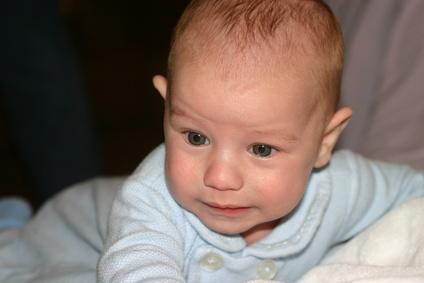Often, babies do not have soft and perfect skin, which comes as a surprise to many parents. Some babies, however, have skin irritations that do not clear up easily. These irritations can turn into rashes and into patchy dry skin–eczema. Treatment involves taking several approaches, all with the advice of your baby’s doctor.
Types of Eczema
According to the American Academy of Pediatrics (AAP) book “Caring for Your Baby and Young Child,” one type of eczema–atopic dermatitis–is first seen at about two to six months of age. This type appears rash-like with red bumps on the face and head and then progresses to the baby’s arms and body. Differentiated from other skin conditions by the extreme itching it causes, babies may scratch at themselves until they bleed or act exceptionally fussy. This form tends to run in families.
The second form of eczema, called contact dermatitis, happens when the baby’s skin encounters something that irritates the skin or that the baby is allergic to. This rash occurs anywhere on the baby that touched the irritant and usually appears within a few hours of contact.
Remove the Irritant
If your baby has contact dermatitis, treatment is often relatively simple if you can determine the cause. In these cases, prevent the irritant from coming into contact with the baby’s skin. The location of the rash can give you clues as to what caused the rash. If it’s around the mouth or face, it may be a food reaction. Tomatoes, strawberries and citrus tend to cause skin irritations. For some children, washing their face immediately after eating these foods prevents the rash all together. Products, such as dyes and those used to stamp tags onto shirts, can cause a rash. The AAP also reports that glues in shoes, neomycin ointment and the nickel found in jewelry and clothing snaps can also irritate the baby’s skin.
Bathing
Bathe babies who have eczema only three times a week, recommends the AAP. The natural oils in the skin will calm the rash. Bathing too often removes these oils, dries the skin and worsens the condition. Use only mild soaps made for sensitive baby skin. Your pediatrician or dermatologist may recommend specific brands to use. The Ask Dr. Sears website recommends Dove and Cetaphil soaps.
Lotions
The AAP recommends that parents only apply lotions to the affected area that have been recommended by their child’s doctor. Although lotions, sometimes medicated ones, are an essential part of treating eczema, using the wrong one may worsen the condition. Some lotions have ingredients that can be irritating. The Ask Dr. Sears website recommends Aquaphor, Eucerin and Keri lotions.
Laundry
Laundry detergents and fabric softeners, in particular those that have added scents and chemicals, can cause skin irritations. Switch to using detergents and fabric softeners that are dye- and scent-free and have no added chemicals advertised on the box. All household laundry needs to be washed with these gentle products because irritants found in your clothes can affect your baby when you hold her. For exceptionally sensitive babies, you may need to make the same request of grandma and grandpa or other family members who spend a lot of time holding and cuddling your baby.
Photo Credit
- baby image by Diane Stamatelatos from Fotolia.com





